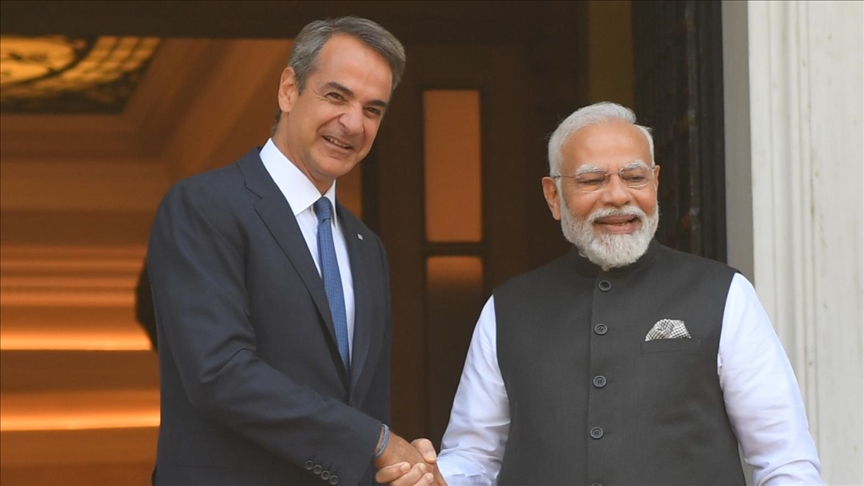Given that India is the fifth largest economy in the world, improving economic relations with India is strategically crucial for Greece. The Greek side speaks of the two countries’ shared positions and entire agreement regarding the preservation of navigation security, adherence to international laws, and the United Nations Convention on the Law of the Sea. It emphasizes that Greece can be a gateway for India to enter the European Union market. Greece also supported signing a free trade agreement between the European Union and India.
In the joint statement, the parties declared their adherence to a “free and open” Mediterranean based on international rules such as the provisions of the United Nations Convention on the Law of the Sea (UNCLOS) and full respect for the sovereignty and territorial integrity of countries and freedom of navigation in the direction of peace and stability.
The prime minister of India emphasized strengthening cooperation in defense and security, infrastructure, agriculture and education sectors, emerging technologies, and elite transfer, which can upgrade the relationship to a strategic level.
Within the framework of the said trip, a memorandum of understanding on cooperation in the agricultural sector was signed, and soon, an immigration agreement will be signed between the two sides. In the meeting of businessmen of the two countries, the severe interest of Indian companies to strengthen relations with Greece was emphasized. Those companies were mainly from the construction, foodstuff, pharmaceutical, energy, tourism, and shipping sectors. The two sides discussed the prospects and ways to strengthen economic and trade cooperation between the two countries, focusing on infrastructure sectors (ports, airports), advanced technology, renewable energy sources, tourism, foodstuff, medicine, and shipping.
According to the prime minister of Greece, today, bilateral relations with India are more vital than ever. In recent years, the two countries have shown a sincere commitment to advance bilateral cooperation in areas of mutual interest, and the visit of the prime minister of India is an essential milestone in developing relations between the two countries. The value of trade reached 1.32 billion euros in 2022, and today, Indian companies see Greece as an essential gateway to enter the European Union market. The Indian company GMR is involved in the construction project of the “Kasteli Airport of Crete Island of Greece,” other companies can also invest in the fields of airports, ports, technology, energy, and renewable energy.
From Greece’s point of view, there are vast capacities for cooperation between the world’s first shipping power and the world’s fifth-largest economy. Greek infrastructures like the “Piraeus Port” can become India’s gateway to Europe. The progress of bilateral cooperation, reflected in the statistics, shows that the value of trade exchanges in 2022 increased by 58% and reached 1.32 billion euros, the highest figure in the past five years.
There are good capacities for cooperation in maritime transport, energy, pharmaceutical, and technology industries. India is seeking access to Greek ports to export its goods to Europe. Also, the issue of establishing a factory in Greece to carry out the final stage of production of some goods in Greece to register them as European goods is under investigation.
India is considering possibly using Piraeus port in Greece to export its products to Europe. The formation of the “I2U2” group in 2021, consisting of India, the United Arab Emirates, the US, and the Zionist regime, has strengthened India’s cooperation with the Mediterranean countries. One of the targets of this international economic forum is to encourage joint investment among member countries in the energy, food security, health, space, transportation, and water sectors.
The group, by using the entrepreneurial spirit of their communities to tackle some of the biggest challenges facing the world, will cooperate with a particular focus on joint ventures and new initiatives in water, energy, transport, space, health, and food security. India expects to be able to access the European markets by using the capacity of the mentioned group through the aforementioned Greek port, which is possible through the ports of the Emirates or Haifa port of the Zionist regime.
Over the past decade, India has strengthened its ties with Greece, expanding its interests from the Indian Ocean to the Eastern Mediterranean. India’s economic security is linked to the control of sea routes connecting Europe to India. Since last year, bilateral trade between the EU and India has reached an all-time high of 130 billion dollars.
The multidimensional trade corridor between India and Greece can change the trade patterns between the Indian Ocean region, the Middle East, and Europe. This corridor creates the commercial connection of the southern edge of Eurasia from the coast of the Indian Sea to the eastern Mediterranean coast of Greece. This new connectivity is a strategic shift for India with geopolitical implications. If India uses the Greek port of Piraeus to transport goods, it will inevitably have to use China-controlled facilities. Because China’s COSCO shipping company, with 67%, has a high share in the Greek port of Piraeus.
After Britain’s exit from the European Union, India is considering alternative export routes to the Union and Eastern Europe. Athens plans to take advantage of this opportunity due to its geographical location. The Prime Minister of India has announced that considering the geographical location of Greece and the close and historical relations between the two countries, he believes this country to be a significant economic, transportation, and strategic gateway for India towards the European Union and Eastern Europe. This cooperation is an essential opportunity for collaboration between Greek and Indian companies. Indian companies always looking for investments abroad can take advantage of Greece’s strategic location.










0 Comments